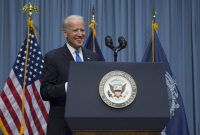Support strong Canadian climate journalism for 2025
Demand for federal cash to help defray the cost of home energy renovations spiked in recent months, forcing the government to close applications for the program almost a year earlier than expected.
With more than half a million applications for the Canada Greener Homes Grant already in, the program is nearing its $2.6-billion budget.
As such, the portal for new applications will close within the next two weeks, Energy Minister Jonathan Wilkinson said Monday.
Enbridge Gas, which partnered with the federal government to deliver the grant program in Ontario, already closed its own application portal Monday.
"It has certainly been more popular perhaps than we had anticipated," Wilkinson said in an interview.
The minister said he thinks cost of living is driving some of the demand, with energy costs up and the grants available to help lower some of those costs over time.
Natural Resources Canada said on average, grant recipients will save an estimated $386 a year on their energy bills.
He said a second phase of the program is being designed now to make the program more accessible to low- and middle-income families.
The grant launched in December 2020, and Wilkinson said the expectation was that applications would be open until about the end of 2024.
Families who have already applied have until 2027 to complete the paperwork to get the grant money.
As of the end of January, nearly 550,000 families had applied for the grant, which offers up to $5,000 for eco-friendly renovations such as installing heat pumps and solar panels, upgrading windows or adding more insulation.
An additional $600 is available to help cover the cost of a home energy audit that is required as part of the application process.
Natural Resources Canada reported Monday that interest in the grant spiked in recent months.
Over the three years, about 475 applications were received daily, on average. In November, that hit 830 per day and in January, it went up to 1,200 per day.
So far, 165,000 grants have been issued based on completed applications. Ontario accounts for one-third of those and Quebec for one-fifth.
Wilkinson said the average payout so far has also exceeded expectation.
The government estimated the average grant would be about $3,500, and instead it has been more than $4,200, largely because heat pumps are among the biggest drivers of the demand for the money.
About 82,000 heat pumps have been installed as a result of the grant program, and another 250,000 are expected as a result of applications that have been received but not yet processed.
Heat pumps are more costly to install compared with many other retrofits.
This program is separate and distinct from a heat pumps grant program that offers up to $15,000 for lower- and middle-income families to replace oil furnaces with electric heat pumps.
The greener homes grant does not specify what type of heating source must be replaced for households to qualify.
The Canada Mortgage and Housing Corp. also offers a greener homes loan program, providing up to $40,000 in interest-free loans for 10 years for eco-renovations.
About 62,000 people have applied for that program since it launched in June 2022, and 53,000 have been approved. About 45 per cent of the loans issued have been for heat pumps.
Wilkinson said lower- and middle-income families haven't been able to take as much advantage of the grant program because it requires homeowners to pay the renovation costs upfront and recoup some of that money through the grant program after the fact.
The renovations can also cost more than the grant offers.
Installing a heat pump averaged about $13,500, the government said.
As such, Wilkinson said, the second phase of the grant will take that amount into account to make the program more accessible to lower-income families.
The government adjusted the oil-to-heat-pump program recently to allow some of the funds to be issued up front, rather than after the pump was installed.
This report by The Canadian Press was first published Feb. 5, 2024.




Comments
So . . . put more money in it. Oil companies are getting billions, they can give this a few more million, sheesh.